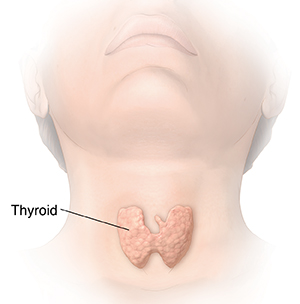Hyperthyroidism
You have been diagnosed with hyperthyroidism. This means you have a thyroid gland that makes too much thyroid hormone. This hormone helps with body growth and metabolism. If you make too much thyroid hormone, many body processes speed up. They may not work right. This can cause symptoms.

Hyperthyroidism can be caused by:
-
Graves' disease. This is the most common cause. This is when the body’s immune system stimulates the thyroid to make more hormone than is needed. This happens more often in women than in men.
-
Postpartum thyroiditis. This is an inflammation of the thyroid gland. It occurs shortly after childbirth. At first, it causes hyperthyroidism. Over time, it leads to an underactive thyroid gland. This is called hypothyroidism.
Symptoms of hyperthyroidism include:
-
Nervousness, anxiety, and irritability
-
Shaking (tremors) that affects the hands and fingers
-
Weight loss even though you have a normal or increased appetite
-
Low tolerance to heat
-
Sweating more than normal
-
Fast or irregular heartbeat, or bounding pulses
-
Lighter or irregular periods
-
More frequent bowel movements
-
Enlarged thyroid gland (goiter)
-
Bulging eyes, double vision, or eye irritation
-
Problems sleeping
-
Muscle weakness
-
Extreme tiredness (fatigue)
-
Swelling of the hands, ankles, or feet (older adults only)
Your healthcare provider will need to do some tests to see which form of hyperthyroidism you have. The types of treatment are different. Treatment may include taking medicines. For instance, antithyroid medicines may be prescribed. These help lower the amount of thyroid hormone made by the thyroid gland. You may also need to take beta-blockers, which treat symptoms such as shakiness, nervousness, and rapid heart rate. Beta-blockers may be taken until the thyroid hormone levels have improved. Tips for taking medicines are given below.
Radioactive iodine treatment or surgery may also be advised. Your healthcare provider will tell you more about these if needed.
Home care
Tips for taking medicines
-
Take any medicines you’re prescribed as directed.
-
Take your medicine at the same time each day.
-
Check with your pharmacist or healthcare provider before using any other medicines. This includes over-the-counter medicines, vitamins, supplements, and herbs. This will help prevent medicine interactions.
-
Use a pillbox labeled with the days of the week. This will help you make sure to take your medicine each day.
-
Ask your healthcare provider about any side effects that may occur and when to report them.
-
Never stop taking medicines on your own. Your symptoms will come back if you do.
General care
-
Always talk with your healthcare provider before trying other treatments for your thyroid.
-
Tell all of your other healthcare providers that you have hyperthyroidism and what treatment you are receiving.
Follow-up care
See your healthcare provider for checkups as advised. You'll need regular follow-up tests to check the level of thyroid hormone in your blood.
When to get medical care
Call your healthcare provider right away if you have any of these:
-
New symptoms
-
Symptoms return, continue, or get worse even with treatment
-
Extreme tiredness
-
Puffy hands, face, or feet
-
Confusion
Call 911
Call 911 if any of these occur:
Online Medical Reviewer:
Marianne Fraser MSN RN
Online Medical Reviewer:
Rajadurai Samnishanth
Online Medical Reviewer:
Rita Sather RN
Date Last Reviewed:
9/1/2024
© 2000-2024 The StayWell Company, LLC. All rights reserved. This information is not intended as a substitute for professional medical care. Always follow your healthcare professional's instructions.